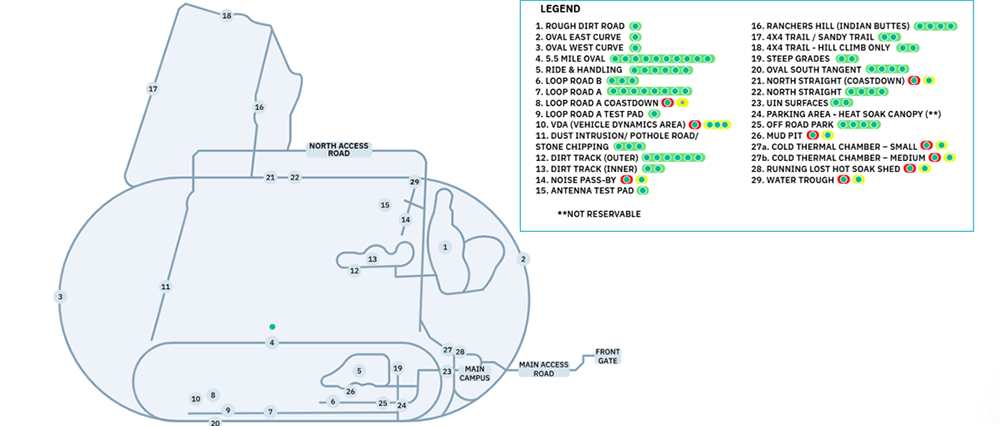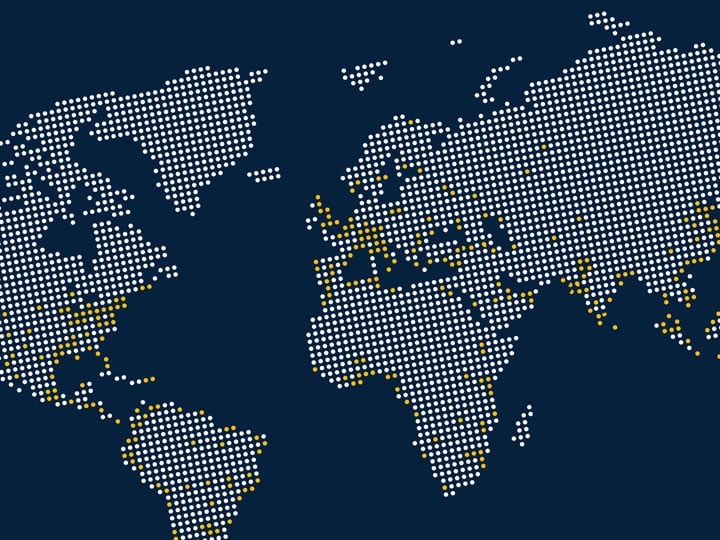Arizona Mobility Test Center Powered by Intertek

With approximately 11,650 acres of space, the Toyota Arizona Proving Grounds is one of the premiere on- and off-road proving grounds for testing new vehicles, automotive components and transportation technology. Now, through the Arizona Mobility Test Center Powered by Intertek (AMTC), all automotive OEMs and suppliers have the opportunity to use this facility and take advantage of the 60 lane miles each of paved and unpaved roads.

Located in Wittmann, Ariz., approximately 60 miles from Phoenix, the facility offers year-round access and is perfectly situated for hot-weather test needs.
Intertek offers a wide range of engineering support services at all phases of product evaluation, such as:
- Product design troubleshooting & recommendations
- R&D support
- New technology requirements
- New automotive market demand
- Performance & safety assessments
- Systems plan development, including analysis on integrated components
- Assistance with documentation
- Simplifying complex requirements
- Identify/solve regulatory & certification requirements
- Identify/solve testing challenges
- Design for compliance with current/upcoming regulations
- Resolve existing issues and anticipate future challenges
- Vacuum Performance
- Coastdown Certification Testing
- Trailer Brake Control Tuning
- Trailer Sawy Response: SAE J2664
- Trailer Tow Test: SAE J2807
- Rapid Air Loss: FMVSS 110
- Noise Pass By: ECE R138, R51, SAE 1470 R51-03, J1492, J986, FMVSS 141
- TPMS: FMVSS 138 and ECE R141
- Fishhook / Sine with Dwell: FMVSS 126 and ECE 140
- ADB Headlight Testing: FMVSS 108
- Ride Confort Measurements
- Routine Handling
- Rim Slip
- Road Lock/Coastdown
- Brake Fade
- Stopping Distance
- Force Stroke Pressure G-Force
- Vapor Lock
- Brake Response
- Pedal Rigidity
- Downhill Vibration
Intertek can perform full vehicle evaluation and validation processes including:
- Fleet Vehicle Monitoring
- Dedicated Short Range Communications (DSRC) V2X
- 5G communications V2X
- Accelerated Mileage Accumulation
- Data Acquisition and Comprehensive Reporting
- Energy Storage System Cycling and Performance Measurement
- EV Infrastructure Testing
- Public Road & Closed Track Testing
- Rough Road Testing
- Evaluate Interoperability between Devices and Vehicles
- Sensor Durability
Additional Capabilities:
- Full Vehicle Testing including real-world and test track mileage accumulation
- Multi-channel data logging capabilities with real-time data upload via LTE/4G/Wi-Fi networks
- Battery Testing
- Electric Vehicle Supply Equipment Testing
- Vehicle Powertrain Component Testing
- Access to fleet operators and contracted drivers to allow for rapid mileage accumulation and real-world performance assessment
- Battery pack cycling/testing
- Closed Track Vehicle Testing
- Public Road Vehicle Testing
- Laboratory Vehicle Testing
Contact Us!
AMTC Track Control: 623-546-5416
Facility Status Line: 623-546-5401
Arizona Mobility Test Center @TAPG
30700 W Patton Road
Wittmann, AZ 85361
Sales: Stuart.Jones@intertek.com
Toyota engaged Intertek Transportation Technologies to expand commercial activities through the Arizona Mobility Test Center. Facility enhancements include creation of a new area for long-term tenants and construction of added amenities for developing and testing vehicle performance. Read full article
Knowledge Center
Master FMVSS 108 Compliance – Download the Expert Guide
Automotive Functional Safety & Cyber Security FAQs
Development of Driveline Electrification Technologies White Paper
Understanding Failure Analysis and Answering your Frequently Asked Questions
The Top-7 FAQs of Autonomous Vehicles Testing
The Top-10 FAQs of Advanced Composites Testing
The Top-10 FAQs of Automotive Interior Testing
Accelerated Stress Testing to Manage Disruptive Market Changes Webinar
Transitioning to Structural Composites to Meet CAFE Standards
Automotive Interiors Testing White Paper
Resources
Global Research & Certification
SatelliteTM Client Test Program
Engineering and Technical Staffing
SupplyTek - gain the confidence to go to market faster
Protek - safeguard people, systems and processes, facilities, materials and surfaces, and products

